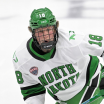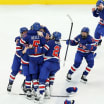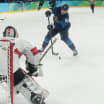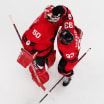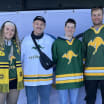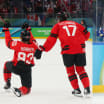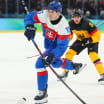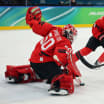BOSTON --When Paul Stewart found out about his future, about his induction into the U.S. Hockey Hall of Fame, he revisited his past. He went to St. Joseph Cemetery in West Roxbury, Massachusetts, to see the grave of his grandfather, the man whose career as an NHL referee and MLB umpire modeled for Stewart what he could become.
Stewart, former NHL referee, had unique path to U.S. Hockey Hall of Fame
First American to work 1,000 regular-season games took chance on new career after playing days
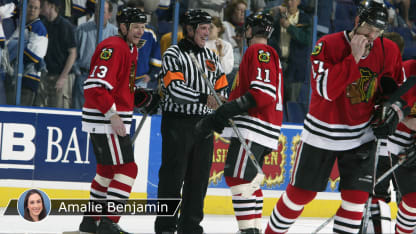
He had been there before, many times, but this time he harkened back to one particular trip to St. Joseph when his father, also an official who worked 19 Beanpot college tournaments in Boston, was ill and dying.
"I stood there at the grave, my grandfather's, and I was looking for some guidance," Stewart recalled of a trip there in the mid-1980s. "It was a terrible, terrible cloudy day. And I actually said, 'I don't know what to do.' Honestly, it sounds crazy, but a beam of light hit the gravestone and I got all warm. And then I knew what to do."
He had been invited to the NHL training camp for referees, a step toward his grandfather's legacy and a step away from the one he had crafted for himself as an oft-penalized player in the NHL and World Hockey Association.
This was his chance.
He took it and, after becoming the first American to referee 1,000 NHL regular-season games, Stewart will join his grandfather in the U.S. Hockey Hall of Fame on Wednesday. He will be inducted with Nashville Predators general manager David Poile, legendary college coach Red Berenson, three-time U.S. Olympian Natalie Darwitz and former NHL player Hago Harrington at the ceremony in Nashville.
Bill Stewart was inducted in 1982, mainly for becoming the first American coach to win the Stanley Cup, with the Chicago Black Hawks (then two words) in 1938.
Paul Stewart would find his own path there.
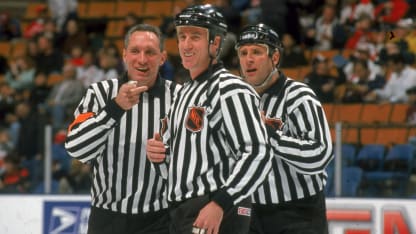
© B Bennett/Getty Images
"If anything, he maybe had too much passion for the game at times, but he always tried to do the right thing for the game of hockey, and that's probably one of the reasons why he's in the Hall of Fame," said NHL director of officiating Stephen Walkom, who officiated alongside Stewart.
And it all started with a pair of skates.
Though Stewart had made do with his sister's hand-me-down figure skates, they weren't optimal for a budding hockey player. The family did not have much money and he didn't anticipate getting his own. But there they were, on the Christmas he was 6, sitting under the tree.
As he recalled saying in a speech he gave in Russia, while holding up a pair of skates, "These skates and others like them that I have worn since I was a little boy, starting with my sister's white skates, these have been my passport to the world. And they've been the ticket to my life."
\\\\
Stewart was on a downward path. He had stopped playing after the 1982-1983 season and had transitioned to life away from hockey, piecing together work as a police officer, car salesman, anything he thought would pay the bills.
"I was doing this whole patchwork quilt of trying to find a life," said Stewart, 64. "And every day I was more and more miserable."
The former forward started as a hockey referee at $5 a game for extra money. He borrowed a sweater from his father, Bill Jr., and used a pair of his own black pants, little shin guards, and no other equipment. He hoisted kids over the boards. He made it work.
He started getting calls. Club games. High school games.
It was suggested that he could do more, do better. He could do college, pro.
He called the office of then-Boston Bruins general manager Harry Sinden and asked who headed up officiating in the NHL. The answer was Scotty Morrison. Stewart placed the call.
Morrison, who knew Stewart's grandfather, told him that he would take care of the tuition if he could get himself to a camp in Milton, Ontario. Stewart flew to Buffalo and rented a car, the cheapest way to get up to Canada for someone who was broke.
"He was a rough, tough hockey player playing with the Quebec Nordiques, and when he suggested to me that he would like to be considered as a referee, I thought you've got to be kidding me," Morrison said.
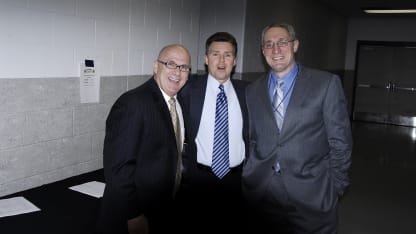
© Steve Babineau/SA/Getty Images
And yet, a week after Stewart returned to Boston, Morrison called him back. They needed him in Toronto for the NHL training camp. This time they sent him the ticket.
"Scotty gave me back my life, seriously," Stewart said.
It was still a long road to the NHL, through the New England junior leagues, through the Atlantic Coast Hockey League, through the American Hockey League, driving a 1972 Gremlin, working as a substitute teacher during his time off. It was a struggle.
"I'm working American League games. I'm working in the OHL, I'm working in the Western (Hockey) League," said Stewart, who became the Eastern College Athletic Conference director of officials in 2007. "One hundred forty-four games. Thirty-seven in 39 nights. I was in Calgary. I started in Salt Lake (City). Went all the way across Canada. I was taking trains and airplanes, snow, you name it. Never sick. Worked every game. One city, next, next, next."
It was that work ethic and his knowledge of the game that finally got him back to the NHL, where he officiated 1,010 NHL regular-season games, 49 in the Stanley Cup Playoffs and two NHL All-Star Games from 1986-2003.
"He was a real good referee," Morrison said. "The players knew he was a tough hockey player and they respected him on that because he knew both sides of it. … And now here he was out on the ice, refereeing, and they knew they would get a real fair shake with him. He wouldn't call those little insignificant penalties. They had to be what we called 'good penalties.' And he knew that very well from his playing days, and players really appreciated it."
\\\\
Still, Stewart was continually a square peg in a round hole, from his time at the elite Groton School in Groton, Massachusetts, to the University of Pennsylvania, to his days in the NHL as a player and a referee. He fought, both literally and figuratively, for everything he had, something he learned growing up in Dorchester, Massachusetts.
"He established a mold that now is really the way the League is trying to go, to try to find high-level ex-players to become involved in officiating," said Brian Murphy, who has been an NHL official since 1988 and worked with Stewart on the ice. "It was kind of an ironic move on his part, because he was a person known [as] somebody who broke the rules. He became somebody who enforced them."
He was a person who continued to work games while getting twice-daily chemotherapy in November and December of 1998, and a person who studied Latin long enough to make a game of figuring out the meanings of words from their roots while working as a substitute teacher. (Stewart was diagnosed with colon cancer in February 1998 and skin cancer in 2017. He is cancer-free.)
Murphy recalled a story that, to him, explained exactly who his close friend has always been.
They were on an early-morning flight back to Boston from Chicago, and Stewart found himself next to historian Doris Kearns Goodwin in first class, not necessarily the biggest draw for the average NHL official.
"That's the beauty of Paul is he can sit next to Doris Kearns Goodwin, talk to her for 2 1/2 hours on a plane about history, and then he can go out and talk to the players like he's one of them," Murphy said.
That was where those skates took him. To Calgary and Moscow, to Canada Cups and Stanley Cup Playoffs, to the first-class seat next to a Pulitzer Prize-winning historian and, now, to the U.S. Hockey Hall of Fame.
Thinking about his path, Stewart choked up, one of perhaps half a dozen times that happened during a 90-minute interview.
"I think about my dad," Stewart said. "I think about my grandfather. Thinking about how much the game meant to me and my family and to have been given this honor is surprising. Because my road has been not the one well-traveled. It's less traveled and rocky."
But like his grandfather before him, Stewart will be enshrined among the greats of the game in the United States. He will be told that taking that chance, changing the direction of his life and livelihood, was exactly the right call.

